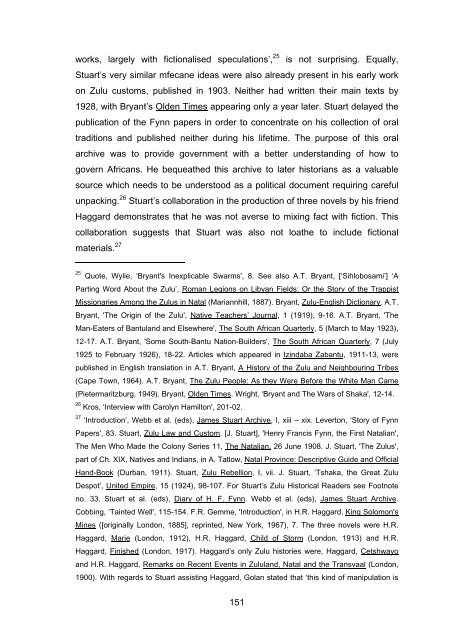The Historiographical Development of the Concept “mfecane” and ...
The Historiographical Development of the Concept “mfecane” and ...
The Historiographical Development of the Concept “mfecane” and ...
You also want an ePaper? Increase the reach of your titles
YUMPU automatically turns print PDFs into web optimized ePapers that Google loves.
works, largely with fictionalised speculations’, 25 is not surprising. Equally,<br />
Stuart’s very similar mfecane ideas were also already present in his early work<br />
on Zulu customs, published in 1903. Nei<strong>the</strong>r had written <strong>the</strong>ir main texts by<br />
1928, with Bryant’s Olden Times appearing only a year later. Stuart delayed <strong>the</strong><br />
publication <strong>of</strong> <strong>the</strong> Fynn papers in order to concentrate on his collection <strong>of</strong> oral<br />
traditions <strong>and</strong> published nei<strong>the</strong>r during his lifetime. <strong>The</strong> purpose <strong>of</strong> this oral<br />
archive was to provide government with a better underst<strong>and</strong>ing <strong>of</strong> how to<br />
govern Africans. He bequea<strong>the</strong>d this archive to later historians as a valuable<br />
source which needs to be understood as a political document requiring careful<br />
unpacking. 26 Stuart’s collaboration in <strong>the</strong> production <strong>of</strong> three novels by his friend<br />
Haggard demonstrates that he was not averse to mixing fact with fiction. This<br />
collaboration suggests that Stuart was also not loa<strong>the</strong> to include fictional<br />
materials. 27<br />
25 Quote, Wylie, ‘Bryant's Inexplicable Swarms', 8. See also A.T. Bryant, [‘Sihlobosami’] ‘A<br />
Parting Word About <strong>the</strong> Zulu’, Roman Legions on Libyan Fields: Or <strong>the</strong> Story <strong>of</strong> <strong>the</strong> Trappist<br />
Missionaries Among <strong>the</strong> Zulus in Natal (Mariannhill, 1887). Bryant, Zulu-English Dictionary. A.T.<br />
Bryant, '<strong>The</strong> Origin <strong>of</strong> <strong>the</strong> Zulu', Native Teachers’ Journal, 1 (1919), 9-16. A.T. Bryant, '<strong>The</strong><br />
Man-Eaters <strong>of</strong> Bantul<strong>and</strong> <strong>and</strong> Elsewhere', <strong>The</strong> South African Quarterly, 5 (March to May 1923),<br />
12-17. A.T. Bryant, 'Some South-Bantu Nation-Builders', <strong>The</strong> South African Quarterly, 7 (July<br />
1925 to February 1926), 18-22. Articles which appeared in Izindaba Zabantu, 1911-13, were<br />
published in English translation in A.T. Bryant, A History <strong>of</strong> <strong>the</strong> Zulu <strong>and</strong> Neighbouring Tribes<br />
(Cape Town, 1964). A.T. Bryant, <strong>The</strong> Zulu People: As <strong>the</strong>y Were Before <strong>the</strong> White Man Came<br />
(Pietermaritzburg, 1949). Bryant, Olden Times. Wright, ‘Bryant <strong>and</strong> <strong>The</strong> Wars <strong>of</strong> Shaka', 12-14.<br />
26 Kros, ‘Interview with Carolyn Hamilton', 201-02.<br />
27 ‘Introduction’, Webb et al. (eds), James Stuart Archive, I, xiii – xix. Leverton, ‘Story <strong>of</strong> Fynn<br />
Papers', 83. Stuart, Zulu Law <strong>and</strong> Custom. [J. Stuart], 'Henry Francis Fynn, <strong>the</strong> First Natalian',<br />
<strong>The</strong> Men Who Made <strong>the</strong> Colony Series 11, <strong>The</strong> Natalian, 26 June 1908. J. Stuart, '<strong>The</strong> Zulus',<br />
part <strong>of</strong> Ch. XIX, Natives <strong>and</strong> Indians, in A. Tatlow, Natal Province: Descriptive Guide <strong>and</strong> Official<br />
H<strong>and</strong>-Book (Durban, 1911). Stuart, Zulu Rebellion, I, vii. J. Stuart, ‘Tshaka, <strong>the</strong> Great Zulu<br />
Despot’, United Empire, 15 (1924), 98-107. For Stuart’s Zulu Historical Readers see Footnote<br />
no. 33. Stuart et al. (eds), Diary <strong>of</strong> H. F. Fynn. Webb et al. (eds), James Stuart Archive.<br />
Cobbing, ‘Tainted Well', 115-154. F.R. Gemme, 'Introduction', in H.R. Haggard, King Solomon's<br />
Mines ([originally London, 1885], reprinted, New York, 1967), 7. <strong>The</strong> three novels were H.R.<br />
Haggard, Marie (London, 1912), H.R. Haggard, Child <strong>of</strong> Storm (London, 1913) <strong>and</strong> H.R.<br />
Haggard, Finished (London, 1917). Haggard’s only Zulu histories were, Haggard, Cetshwayo<br />
<strong>and</strong> H.R. Haggard, Remarks on Recent Events in Zulul<strong>and</strong>, Natal <strong>and</strong> <strong>the</strong> Transvaal (London,<br />
1900). With regards to Stuart assisting Haggard, Golan stated that ‘this kind <strong>of</strong> manipulation is<br />
151

















